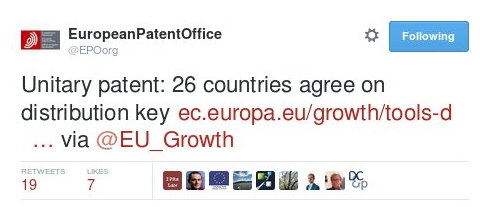

OVER the weekend, due to an unprecedented backlog (we receive a lot of material), we published almost a dozen articles, mostly about the EPO (see our Wiki for a complete list of these articles). Both on Saturday and on Sunday we took note of UPC lobbying by Battistelli, which wasn't exactly news to us. We wrote about EPO lobbying for the Unitary Patent several times before, e.g. [1, 2], and this previous lobbying served to show that -- to use SUEPO's older words -- the EPO is "out of control".
"The I.U. or Control Risks might be exempted from these Office-wide bans and we already know, based on accusations against staff representatives, that Techrights is really worrying to both the I.U. and Control Risk."Just before the weekend we implemented new anti-DDOS (or DDOS prevention/mitigation) techniques and this morning, despite the fact that Techrights has been banned from inside EPO networks, IP addresses from inside the EPO (unambiguously registered as "European Patent Office") got banned for traffic floods. The I.U. or Control Risks might be exempted from these Office-wide bans and we already know, based on accusations against staff representatives, that Techrights is really worrying to both the I.U. and Control Risks. The latter might be able to use parallel construction to gather ‘evidence’, in our humble assessment -- a subject of ongoing discussion [1, 2]. If these aren't the symptoms of a out-of-control public service, what is?
Someone has sent us several pointers suggesting that the EPO has been out of control for quite a long time.
To quote Jean-Dominique Giuliani, président de la Fondation Robert Schuman:
On ne peut donc exclure de voir se développer, sous le contrôle de la Cour de justice, voire du Parlement ou de la seule Cour des Comptes européenne, des Autorités indépendantes qui réguleraient le marché intérieur ou même qui jugeraient des contentieux spécialisés en première instance. C'est une évolution qui a commencé. Déjà la Banque centrale européenne échappe au contrôle de la Commission. L'Office européen des Brevets ne relève pas de sa compétence. Sur les 31 agences de l'Union, trois seulement relèvent de programmes communautaires, 6 dépendent du €« troisième pilier €», c'est-à-dire de la coopération intergouvernementale et les 22 autres €« agences communautaires €» disposent, pour certaines d'entre elles, d'une quasi-indépendance comme l'Agence européenne des médicaments.
Il y a de fortes probabilités pour que les nouvelles compétences européennes, et même certaines plus anciennes, relèvent dans un avenir proche de régulateurs européens. Pensons à l'énergie, à la télévision, aux télécommunications. Ces évolutions conditionnent les changements qui pourraient intervenir dans ce qu'il est convenu d'appeler la €« méthode communautaire €».
RP: I have seen it suggested that the Community patent should be combined with the EPO system, and the EPO made an EU organisation. Is that a likely way forward?
GK: This is of course a highly political question. Certainly so far no such proposal has been made officially. Rather it is likely there will be an agreement between the EU and the EPO, which would specify what our tasks were in carrying out the regulation of the Community patent.
Alfons Schäfers, German lawyer and representative of Deutsche Vereinigung für gewerblichen Rechtsschutz und Urheberrecht (GRUR), was interviewed [PDF] by SUEPO and said:
Suepo: What should the relationship between the EU and EPO?
Alfons Schäfers: The EPO should become part of the European Union, like the OHIM in Alicante. To keep the EPO outside that framework is quite ridiculous at a time when the EU is expanding to the political and historical boundaries of Europe. The EU institutions — especially the European Parliament, must be given the wherewithal to exercise firm democratic control and to frame and implement European patent legislation. That is the only way to overcome the European Parliament's growing suspicion of patent law.
5.1. General structure of the European patent
Do you share the view that the current structure of the European Patent Office, a body which is independent of the Community institutions, does not entail disadvantages for users which should be overcome through a different legal structure which is more closely integrated into Community law?
No, the chemical industry does not share this view, as the current structure is wrong. The EPO should become an EU Institution, and pursue its task to manage the European patent, which is a bundled one, and run as well the new Community unitary patent. It should be run efficiently and at running costs. Arrangements should be made with those countries which are not member of the EU so that they still have access to the European patent.
Source: Web Archive [PDF]
"Who needs ludicrous stuff like I.S.D.S. when you have the EPO Trojan horse right inside the government, complete with politicians and political connections, not to mention spies (like covert operations), immunity from the law, and exemptions from basic human rights?"From being merely a quasi-private institution (we have future articles about it) the EPO has become part of the state and now serves multinational corporations. Who needs ludicrous stuff like I.S.D.S. when you have the EPO Trojan horse right inside the government, complete with politicians and political connections, not to mention spies (like covert operations), immunity from the law, and exemptions from basic human rights? Remember that, moreover, the EPO is a state-mandated monopoly, so it's effectively "too big to fail".
The EPO is worse than the Vatican. At least the Vatican isn't a corporate entity but a religious one. The Vatican does not have a suicides epidemic, either. ⬆